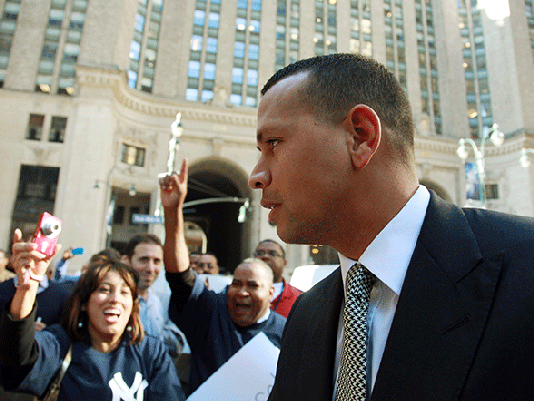Here’s a powerful story from my pal Paul Solotaroff. It originally appeared in the Village Voice (1990) and it is presented here with the author’s permission.

“The Power and the Gory”
By Paul Solotaroff
Half the world was in mortal terror of him. He had a sixty-inch chest, twenty-three-inch arms, and when the Anadrol and Bolasterone backed up in his bloodstream, his eyes went as red as the laser scope on an Uzi. He threw people through windows, and chased them madly down Hempstead Turnpike when they had the temerity to cut him off. And in the gym he owned in Farmingdale, the notorious Mr. America’s, if he caught you looking at him while he trained, you generally woke up, bleeding, on the pavement outside. Half out of his mind on androgens and horse steroids, he had this idea that being looked at robbed him of energy, energy that he needed to leg-press two thousand pounds. Nonetheless, one day a kid walked up to him between sets and said, “I want to be just like you, Steve Michalik. I want to be Mr. America and Mr. Universe.”
“Yeah?” said Michalik in thick contempt. “How bad do you think you want it?”
“Worse than anything in the world,” said the kid, a scrawny seven-teen-year-old with more balls than biceps. “I can honestly say that I would die for a body like yours.”
“Well, then you probably will,” snorted Michalik. “Meet me down at the beach tomorrow at six A.M. sharp. And if you’re like even half a minute late …”
The kid was there at six A.M. pronto, freezing his ass off in a raggedy hood and sweats. “What do we do first?” he asked.
“Swim,” grunted Michalik, dragging him into the ocean. Twenty yards out, Michalik suddenly seized the kid by his scalp and pushed him under a wave. The kid flailed punily, wriggling like a speared eel. A half minute, maybe forty-five seconds, passed before Michalik let the kid up, sobbing out sea water. He gave the kid a breath, then shoved him down again, holding him under this time until the air bubbles stopped, whereupon he dragged him out by the hood and threw him, gasping, on the beach.
“When you want the title as bad as you wanted that last fucking breath,” sneered Michalik, “then and only then can you come talk to me.”
For himself, Michalik only wanted two things anymore. He wanted to walk on stage at the Beacon Theater on November 15, 1986, professional bodybuilding’s Night of Champions, and just turn the joint out with his 260 pounds of ripped, stripped, and shrink-wrapped muscle. And then, God help him, he wanted to die. Right there, in front of everybody, with all the flashbulbs popping, be wanted to drop dead huge and hard at the age of thirty-nine, and leave a spectacular corpse behind.
The pain, you see, had become just unendurable. Ten years of shot-gunning steroids had turned his joints into fish jelly and spiked his blood pressure so high he had to pack his nose to stop the bleeding. He’d been pissing blood for months, and what was coming out of him now was brown, pure protoplasm that his engorged liver hadn’t the wherewithal to break down. And when he came home from the gym at night, his whole body was in spasm. His eight-year-old boy, Steve Junior, had to pack his skull in ice, trying to take the top 10 percent off his perpetual migraine.
“I knew it was all over for me,” Michalik says. “Every system in my body was shot, my testicles had shrunk to the size of cocktail peanuts. It was only a question of which organ was going to explode on me first.
“See, we’d all of us [professional bodybuilders] been way over the line for years, and it was like, suddenly, all the bills were coming in. Victor Faizowitz took so much shit that his brain exploded. The Aldactazone [a diuretic] sent his body temperature up to one hundred twelve degrees, and he literally melted to death. Another guy, an Egyptian bodybuilder training for the Mr. Universe contest, went the same way, a massive hemorrhage from head to toe—died bleeding out of every orifice. And Tommy Sansone, a former Mr. America who’d been my very first mentor in the gym, blew out his immune system on Anadrol and D-ball [Dianabol], and died of tumors all over his body.
“As for me, I couldn’t wait to join ’em. I had so much evil in me from all the drugs I was taking that I’d go home at night and ask God why be hadn’t killed me yet. And then, in the next breath, I’d say, ‘Please, I know I’ve done a lot of terrible things—sold steroids to kids, beaten the shit out of strangers—but please don’t let me go out like a sucker, God. Please let me die hitting that last pose at the Beacon, with the crowd on its feet for a second standing O.'”
Michalik’s prayers might better have been addressed to a liver specialist. Two weeks before the show, he woke up the house at four in the morning with an excruciating pain beneath his rib cage. His wife, Thomasina, long since practiced at such emergencies, ran off to fetch some ice.
“Fuck the ice,” he groaned. “Call Dr. Ludwig.”
Dr. Arthur Ludwig, a prominent endocrinologist who had been treating Michalik on and off for a number of years, was saddened but unsurprised by the call. “Frankly,” he told Michalik, “I’ve been expecting it now for ages. Your friends have been telling me lately how bad you’ve been abusing the stuff, especially for the last five years.”
That he certainly had. Instead of cycling on and off of steroids, giving his body here and there a couple months’ recuperation, Michalik had been juicing pretty much constantly since 1976, shooting himself with fourteen different drugs and swallowing copious amounts of six or seven others. Then there was all the speed he was gulping—bennies, black beauties—to get through his seven-hour workouts, and the handful of downs at night to catch four hours of tortuous sleep.
There, at any rate, Michalik was, doubled over in bed at four in the morning, his right side screaming like a bomb had gone off in it.
“You’d better get him to New York Hospital as fast as you can,” Ludwig told Michalik’s wife over the phone. “They’ve got the best liver specialist on the East Coast there. I’ll meet you in his office in an hour.”
At the hospital, they pumped Michalik full of morphine and took a hasty sonogram upstairs. The liver specialist, a brusque Puritan who’d been apprised of Michalik’s steroid usage, called him into his office.
“See this?” he pointed to the sonogram, scarcely concealing a sneer. “This is what’s left of your liver, Mr. Michalik. And these”—indicating the four lumps grouped inside it, one of them the size of a ripe grapefruit—”these are hepatic tumors. You have advanced liver cancer, sir.”
“I do?” grinned Michalik, practically hugging himself for joy. “How long you think I’ve got?”
“Mr. Michalik, do you understand what I’m telling you?” snapped the doctor, apparently miffed that his news hadn’t elicited operatic grief. “You have cancer, and will be dead within weeks or days if I don’t operate immediately. And frankly, your chances of surviving surgery are—”
“Surgery!” blurted Michalik, looking at the man as if he were bonkers. “You’re not coming near me with a knife. That would leave a scar.” The doctor was with perfect justice about to order Michalik out of his office when Ludwig walked in. He took a long look at the sonogram and announced that surgery was out of the question. Michalik’s liver was so compromised, he would undoubtedly die on the table. Besides, Ludwig adjudged, those weren’t tumors at all. They were something rarer by far but no less deadly: steroid-induced cysts, or thick sacs of blood and muscle, that were full to bursting—and growing.
He ordered Michalik strapped down—the least movement now could perforate the cysts—and wheeled upstairs to intensive care. The next twenty-four hours, he declared, would tell the tale. If, deprived of steroids, the cysts stopped growing, there was a small chance that Michalik might come out of this. If, on the other hand, they fed on whatever junk he’d injected the last couple of days—well, he’d get his wish, at any rate, to die huge.
Michalik knew it was the liver, of course. He might have been heedless, but he was hardly uninformed. In fact, he knew so much about steroids that he’d written a manual on their use, and gone on the Today show to debate doctors about their efficacy. Like the steroid gurus of southern California, Michalik was a self-taught sorcerer whose laboratory was his body. From the age of eleven, he’d read voraciously in biochemistry, obsessed about finding out what made people big. He walked the streets of Brooklyn as a teenager, knocking on physicians’ doors, begging to be made enlightened about protein synthesis. And years later he scoured the Physicians’ Desk Reference from cover to cover, searching not for steroids but for other classes of drugs whose secondary function was to grow muscle.
Steroids, Michalik knew, were a kind of God’s play, a way of rewriting his own DNA. He’d grown up skinny and hating himself to his very cell level. According to Michalik, his father, a despotic drunk with enormous forearms, beat him with whatever was close to hand, and smashed his face, for fun, into a plate of mashed potatoes.
“I was small and weak, and my brother Anthony was big and graceful, and my old man made no bones about loving him and hating me,” Michalik recalls. “The minute I walked in from school, it was, ‘You worthless little shit, what are you doing home so early?’ His favorite way to torture me was to tell me he was going to put me in a home. We’d be driving along in Brooklyn somewhere, and we’d pass a building with iron bars on the windows, and he’d stop the car and say to me, ‘Get out. This is the home we’re putting you in.’ I’d be standing there, sobbing on the curb—I was maybe eight or nine at the time—and after a while he’d let me get back into the car and drive off laughing at his little joke.”
Fearful and friendless throughout childhood—even his brother was leery of being seen with him—Michalik hid out in comic books and Steve Reeves movies, burning to become huge and invulnerable. At thirteen, he scrubbed toilets in a Vic Tanny spa just to be in the presence of that first generation of iron giants—Eddie Juliani and Leroy Colbert, among others. At twenty, stationed at an Air Force base in Southeast Asia, he ignored sniper fire and the 120-degree heat to bench-press a cinder-block barbell in an open clearing, telling the corps psychiatrist that he couldn’t be killed because it was his destiny to become Mr. America. And at thirty-four, years after he’d forgotten where be put all his trophies, he was still crawling out of bed at two in the morning to eat his eighth meal of the day because he still wasn’t big enough. As always, there was that fugitive inch or two missing, that final heft without which he wouldn’t even take his shirt off on the beach—for fear that everyone would laugh.
And so, of course, there were steroids. They’d been around since at least the mid-1930s, when Hitler had them administered to his SS thugs to spike their bloodlust. By the fifties, the eastern bloc nations were feeding them to school kids, creating a generation of bioengineered athletes. And in the late sixties, anabolics hit the beaches of California, as U.S. drug companies discovered that there was a vast new market out there of kids who’d swallow anything to double their pecs and their pleasure.
The dynamics of anabolic steroids have been pretty well understood for years. Synthetic variations of the male hormone testosterone, they enter the bloodstream as chemical messengers and attach themselves to muscle cells. Once attached to these cells, they deliver their twofold message: grow, and increase endurance.
Steroids accomplish the first task by increasing the synthesis of protein. In sufficient quantities, they turn the body into a kind of fusion engine, converting everything, including fat, into mass and energy. A chemical bodybuilder can put on fifty pounds of muscle in six months because most of the 6,000 to 10,000 calories he eats a day are incorporated, not excreted.
The second task—increasing endurance—is achieved by stimulating the synthesis of a molecule called creatine phosphate, or CP. CP is essentially hydraulic fluid for muscles, allowing them to do more than just a few seconds’ work. The more CP you have in your tank, the more power you generate. Olympic weightlifters and defensive linemen have huge stockpiles of CP, some portion of which is undoubtedly genetic. The better part of it, though, probably comes out of a bottle of Anadrol, a popular oral steroid that makes you big, strong, and savage—and not necessarily in that order.
Over the course of eleven years, Michalik had taken ungodly amounts of Anadrol. If his buddies were taking two 50 mg tablets a day, he took four. Six weeks later, when he started to plateau, he jacked the ante to eight. So, too, with Dianabol, another brutal oral steroid. Where once a single 5 mg pill sufficed, inevitably he was gulping ten or twelve of them a day, in conjunction with the Anadrol.
The obstacle here was his immune system, which was stubbornly going on about its business, neutralizing these poisons with antibodies and shutting down receptor sites on the muscle cells. No matter. Michalik, upping the dosage, simply overwhelmed his immune system, and further addled it by flooding his bloodstream with other drugs.
All the while, of course, he was cognizant of the damage done. He knew, for instance, that Anadrol, like all oral steroids, was utter hell on the liver. An alkylated molecule with a short carbon chain, it had to be hydralized, or broken down, within twenty-four hours. This put enormous stress on his liver, which had thousands of other chemical transactions to carry out every day, not the least of which was processing the waste from his fifty pounds of new muscle. The Physicians’ Desk Reference cautions that the smallest amounts of Anadrol may be toxic to the liver, even in patients taking it for only a couple of months for anemia:
WARNING: MAY CAUSE PELIOSIS HEPATIS, A CONDITION IN WHICH LIVER TISSUE IS REPLACED WITH BLOOD-FILLED CYSTS, OFTEN CAUSING LIVER FAILURE. . . . OFTEN NOT RECOGNIZED UNTIL LIFE-THREATENING LIVER FAILURE OR INTRA-ABDOMINAL HEMORRHAGE OCCURS. . . . FATAL MALIGNANT LIVER TUMORS ARE ALSO REPORTED.
As lethal as it was, however, Anadrol was like a baby food compared to some of the other stuff Michalik was taking. On the bodybuilding black market, where extraordinary things are still available, Michalik and some of his buddies bought the skulls of dead monkeys. Cracking them open with their bare hands, they drank the hormone-rich fluid that poured out of the hypothalamus gland. They filled enormous syringes with a French supplement called Triacana and, aiming for the elusive thyroid gland, shot it right into their necks. They took so much Ritalin before workouts to psych themselves up that one of Michalik’s training partners, a former Mr. Eastern USA, ran out of the gym convinced that he could stop a car with his bare hands. He stood in the passing lane of the Hempstead Turnpike, his feet spread shoulder-width apart, bracing for the moment of impact—and got run over like a dog by a Buick Skylark, both his legs and arms badly broken.
Why, knowing what he knew about these poisons, did Michalik continue taking them? Because he, as well as his buddies and so many thousands of other bodybuilders and football players, were fiercely and progressively addicted to steroids. The American medical community is currently divided about whether or not the stuff is addictive. These are the same people who declared, after years of thorough study, that steroids do not grow muscle. Bodybuilders are still splitting their sides over that howler. Michalik, however, is unamused.
“First, those morons at the AMA say that steroids don’t work, which anyone who’s ever been inside a gym knows is bullshit,” he snorts. “Then, ten years later, they tell us they’re deadly. Oh, now they’re deadly? Shit, that was like the FDA seal of approval for steroids. C’mon, everybody, they must be good for you—the AMA says they’ll kill you!
“Somehow, I don’t know how, I escaped getting addicted to them the first time, when I was training for the Mr. America in 1972. Maybe it was because I was on them for such a short stretch, and went relatively light on the stuff. Mostly, all it amounted to was a shot in the ass once a week from a doctor in Roslyn. I never found out what was in that shot, but Jesus, did it make me crazy. Here I was, a churchgoing, gentle Catholic, and suddenly I was pulling people out of restaurant booths and threatening to kill them just because there were no other tables open. I picked up a three-hundred-pound railroad tie and caved in the side of some guy’s truck with it because I thought he’d insulted my wife. I was a nut, a psycho, constantly out of control—and then, thank God, the contest came, and I won it and got off the juice, and suddenly became human again. I retired, and devoted myself entirely to my wife for all the hell I’d put her through, and swore I’d never go near that shit again!”
A couple of years later, however, something happened that sent him back to the juice, and this time there was no getting off it. “I’d bought Thomasina a big house in Farmingdale, and filled it with beautiful things , and was happier than I’d ever been in my life. And then one day I found out she’d been having an affair. I was worse than wiped out, my soul was ripped open. It had taken me all those years to finally feel like I was a man, to get over all the things my father had done to me … and she cut my fucking heart out.”
Michalik went back to the gym, where he’d always solved all his problems, and started seeing someone we’ll call Dr. X. A physician and insider in the subculture, for two decades Dr. X had been supplying bodybuilders with all manner of steroids in exchange for sexual favors. Michalik hit him up for a stack of prescriptions, but made it clear that he couldn’t accommodate the doctor sexually, to the latter’s keen disappointment. The two, however, worked out a satisfactory compromise. Michalik, the champion bodybuilder who was constantly being consulted by young wannabes, directed some of them posthaste to the tender governance of Dr. X.
“They had to find out sooner or later that the road to the title went through Dr. X’s office,” Michalik shrugs. “Nobody on this coast was gonna get to be competition size unless they put out for him—that, or they had a daddy in the pharmaceutical business. The night Dr. X first tried to seduce me, he showed me pictures of five different champions that he said he’d had sex with. I checked it out later and found out it was all true. Nice business, isn’t it, professional bodybuilding? More pimps and whores than Hollywood.”
Michalik didn’t care about any of that, however. Nor did he care if he went crazy or got addicted to steroids. “I didn’t care if I fucking died from ’em. All I cared about was getting my body back. I was down to one hundred fifty pounds, which was my natural body weight, and no one in the gym even knew who I was. Big guys were screaming at me, ‘Get off that bench, you little punk, I wanna use it!’ Three months later, I’m two hundred pounds and bench-pressing four hundred, and the same guys are coming over to me, going, ‘Hey, aren’t you Steve Michalik? When did you get here?’ And I’d tell ’em, ‘I’ve been here for the last three months, motherfucker. I’m the guy you pushed offa that bench over there, remember?'”
By that third month, he recalls, he was hopelessly hooked on steroids, unable to leave the house without “gulping three of something, and taking a shot of something else. I’d get out of bed in the morning feeling weak and sick, and stagger around, going, ‘Where’s my shit?’ I was a junkie and I knew it and I hated myself for it. But what I hated much, much more was not getting to Dr. X’s office. He had the real hot shit—Primobolan, Parabolin—that you couldn’t get anywhere else. They were so powerful you felt them immediately in your muscles, and tasted them for hours on your lips. My heart would start pounding, and the blood would come pouring out of my nose, but he’d just pack it with cotton and send me on my way.
“Suddenly, all I was doing was living and dying for those shots. I was totally obsessed about seeing him, I’d have terrible panic attacks on the subway, my brain would be racing—was I going to make it up to his office before I fell down? I was throwing people out of my way, shoving ’em into poles, practically knocking the door down before we pulled into the station.
“Understand, there was no justification for the things I did; not my wife’s affair, not what had happened to me as a kid—nothing. I was an adult, I knew what I was doing, at least at the beginning, and when you add it all up, I deserve to have died from it.
“But I want you to understand what it’s like to just completely lose yourself. To get buried in something so deep that you think the only way out is to die. Those ten years, it was like I was trapped inside a robot body, watching myself do horrible things, and yelling, ‘Stop! Stop!’ but I couldn’t even slow down. It was always more drugs, and more side effects, and more drugs for the side effects. For ten years, I was just an animal on stimulus-response.”
He flew to London in the fall of 1975 for the Mr. Universe show, already so sick from the steroids and the eight meals a day that he could scarcely make it up the stairs to the stage. “I had a cholesterol level of over 400, my blood pressure was 240 over 110—but, Jesus Christ, I was a great-looking corpse. No one had ever seen anything like me on stage before, I had absolutely perfect symmetry: nineteen-inch arms, nineteen-inch calves, and a fifty-four-inch chest that was exactly twice the size of my thighs. The crowd went bazongo, the judges all loved me—and none of it, not even the title, meant shit to me. Joy, pride, any sense of satisfaction—the drugs wiped all of that out of me. The only feeling I was capable of anymore was deep, deep hatred.”
Michalik went home, threw his trophy into a closet, and began training maniacally for the Mr. Olympia show, bodybuilding’s most prestigious event. He’d invented a training regimen called “Intensity/Insanity,” which called for seventy sets per body part instead of the customary ten. This entailed a seven-hour workout and excruciating pain, but the steroids, he found, turned that pain into pleasure, “a huge release of all the pressure built up inside me, the rage and the energy.”
And with whatever rage and energy he had left, he ran his wife’s panicked lover out of town, and completed his revenge by impregnating her “so that there’d be two Steve Michalik’s in the world to oppress her.” Spotlessly faithful to her for the first ten years of their marriage, he began nailing everyone he could get his hands on now, thanks in no small part to his daily dosage of Halotestin, a steroid whose chief side effect was a constant—and conspicuous—erection. He was also throwing down great heaps of Clomid and HCG, two fertility drugs for women that, in men, stimulate the production of testosterone.
“Bottom line, I was insatiable, and acting it out all over the place. I had girlfriends in five different towns in Long Island, and one day I was so hormone-crazed I fucked ’em all, one right after the other. Suddenly, I saw why there was so much rampant sex in this business, why the elite bodybuilders always had two or three girls in their hotel room, or were making thousands of dollars a weekend at private gay parties. In fact, one of my friends in the business, a former Mr. America, used to get so horny on tour that he’d fuck the Coke machine in his hotel. Swear to God, he’d stick his dick right in the change slot and bang it for all he was worth. I’m telling you, my wife saw him do this, she can vouch for it. He fucked those machines from coast to coast, and even had ratings for them. I seem to remember the Chicago Hyatt’s being pretty high up there on the list.”
Hot, in any event, off his win in the Mr. Universe, and absolutely galactic now at 250 pounds, he was the consensus pick among his peers to put an end to Arnold Schwarzenegger’s reign as Mr. Olympia and begin a five- or six-year run of his own. He had even prepped himself to follow Ahnuld into show business, taking two years of acting lessons and a year of speech at Weiss-Baron Studios in Manhattan. One of the networks approached him about hosting a science show. George Butler and Charles Gaines filmed him extensively for Pumping Iron, the definitive bodybuilding flick that put Schwarzenegger on the map in Hollywood.
And then, driving himself to the airport for the Mr. Olympia show that November, Michalik suddenly ran into something bigger than steroids. A tractor-trailer driver, neglecting to check his mirror, veered into Michalik’s lane on Route 109 and ran right over the hood of his Mustang. Michalik was dragged twenty yards into an embankment; the Mustang crumpled up around him. When they finally sawed him out of it two hours later, he had four cracked discs and a torn sciatic nerve, and was completely paralyzed from the waist down.
The bad news, said the surgeon after a battery of X-rays, was that Michalik would never walk again. The good news was that with a couple of operations, the pain could be substantially mitigated. Michalik told him to get the fuck out of his room. For months he lay in traction, refusing medication, and with his free arm went on injecting himself with testosterone, which had with him in a black bag at the time of the accident, and which the hospital had so thoughtfully put on his bedside table.
“It was hilarious. The idiot doctors kept coming in and going. ‘Gee, your blood pressure seems awfully high, Mr. Michalik,’ and I’d just lay there with a straight face and go, ‘Well, I have been very tense, you know, since the accident’
“Meanwhile, for the one and only time in my life, the steroids were actually helping me. They speeded up the healing, which is actually their medical purpose, and kept enough size on me so that the nurses used to fight over who was supposed to wash me every day. I started getting a little sensation back in my right leg, enough so that when the doctor told me he’d send me home if I could stand up, I managed to fake it by standing on one leg.”
There, however, the progress halted, and Michalik, unspeakably depressed, lay in bed for a year, bloating on steroids and chocolate chip cookies. He got a call from the TV people, telling him that they’d hired Leonard Nimoy to replace him on the science show. He got another one from the producers of Pumping Iron, informing him that he’d been all but cut out of the film. Worst of all, his friends and training partners jumped ship on him, neither calling nor coming by to see him.
“So typical of bodybuilders,” he sneers. “‘Hey, Michalik’s crippled, I gotta go see him—nah, it’s Tuesday, chest-and-back day. Fuck him.’ But the real reason, I think, was they couldn’t stand to see one of their own hurt. In order to keep on doing what they’re doing—the drugs, the binge eating, the sex-for-money—they’ve gotta keep lying to themselves, saying, ‘I can’t be hurt, I can’t get sick. I’m Superman. Cancer is afraid to live in my body.'”
About the only person who didn’t abandon him was his kid brother, Paulie, an adopted eight-year-old who utterly worshipped Michalik. “He used to come into my room every day and massage my legs, going, ‘You feel anything yet? You feel it?’ He’s stubborn like me. He just refused to give up, he kept saying, ‘You’re a champion, Steve, you’re my hero, you’re gonna be back.’
“And then one day we’re watching TV, and a pro bodybuilding show comes on. This was 1978, and the networks had started up a Grand Prix tour to cash in on the fad after Pumping Iron. I’m watching all the guys and just going crazy, wishing I could just get up on stage against ’em one more time, and Paulie goes, ‘You can do it, Steve. You can come back and whip those guys. I’ll help you in the gym.'”
Aroused, Michalik called an old friend, Julie Levine, and begged him for the keys to his new gym in Amityville. The next night, he got out of bed at 2 A.M. and scuttled to the window, where Paulie assisted him over the sash. Crawling across the lawn to his wife’s car, Michalik got in the driver’s seat and pushed his dead legs back, making room for his little brother beneath the steering wheel. As he steered, Paulie worked the gas and brake pedals with his hands, and in this manner they accomplished the ten miles to Amityville.
In the gym, Paulie dragged him from machine to machine, helping him push the weight stacks up. Michalik’s upper body responded quickly—muscle had remarkable memory—but his legs, particularly the left one, lay there limp as old celery. After several months, however, the pain started up in them. Sharp and searing, it was as if someone had stuck a fork in his sciatic nerve. Michalik, a self-made master of pain couldn’t have been happier if he’d hit the lottery.
“The doctors all told me it would be ten years, if ever, for the nerve to come back, and here it was howling like a monster. I kicked up the dosages of all the stuff I was taking, and started attacking the weights instead of just lifting ’em. Six months later, the pain was so bad I still could barely straighten up—but I was leg-pressing seven hundred and eight hundred pounds, and my thighs were as big as a bear’s.”
And a year after that, he walked on stage in Florida, an unadvertised guest poser at the end of a Grand Prix show. The crowd, recognizing a miracle when it saw one, went berserk as Michalik modeled those thirty-four-inch thighs, each of which was considerably wider than his twenty-seven-inch waist. Schwarzenegger, in the broadcast booth doing color for ABC, was overwhelmed. “I don’t believe what I am seeing,” he gasped. “It’s Steve Michalik, the phantom bodybuilder!”
There Michalik should have left it. He was alive, and ambulatory, and his cult status was set. Thanks to Arnie, he would be forever known as the Phantom Bodybuilder, a tag he could have turned into a merchandising gold mine, and retired.
But like a lot of other steroid casualties, Michalik couldn’t stop pushing his luck. He had to keep going, had to keep growing, testing the limits of his skeleton and the lining of his liver. If he’d gotten galactic, he figured, on last year’s drugs, there was no telling how big he could get on this year’s crop. A new line of killer juice was coming out of southern California—Hexalone, Bolasterone, Dehydralone—preposterously toxic compounds that sent the liver into warp drive but which grew hard, mature muscle right before your very eyes. Sexier still, there was that new darling of the pro circuit, human growth hormone, and who knew where the ceiling even began on that stuff?
Instead of pulling over, then, Michalik put the hammer down. He joined the Grand Prix tour immediately after the show in Florida and began the brutal grind of doing twelve shows annually. Before the tour, top bodybuilders did five shows a year, tops—the Mr. Olympia, the Night of Champions, and two or three others in Europe—which gave them several months to recuperate from the drugs and heavy training. Now, thanks to TV, they had to do a show a month. The pace was quite literally murderous.
“Not only did guys have to peak every month, they had to keep getting better as the year went on. No downtime, no rest from the binging and fasting—you could see guys turning green from all the shit in their systems. As you might expect, some of them were falling by the wayside, one guy from arrhythmia, another guy from heart attacks.
“As for me, all I knew was that I was spending every dime I had on drugs. It cost me $25,000 that first year just to keep up, and that was without human growth hormone, which I couldn’t even afford. The sport had become like an arms race now. If you heard that some guy was using Finajet, then you had to have it, no matter what it cost or where you had to go to get it. It actually paid to fly back and forth to France every couple of months, where you could buy the crap off the shelves of some country pharmacy and save yourself thousands of bucks.
“Needless to say, those five years on the tour were the most whacked-out of my life. My cognitive mind went on like a permanent stroll, and I became an enormous, lethal caveman. The only reason I didn’t spend most of that time in jail was because two thirds of the cops in town were customers of mine. They belonged to my gym, and bought their steroids from me, and when I got into a little beef, which was practically every other day, they took care of it on the QT for me.
“Once I was on Hempstead Turnpike, on my way to the gym, when some guy in a pickup gave me the finger. That’s it, lights out. I chased him doing ninety in my new Corvette, and did a three-sixty in heavy traffic right in front of him. I jumped out, ripped the door off his truck, and caved in his face with one punch. The other guy in the cab, who had done nothing to me, jumps out and starts running down the divider to get away from me. I chased him on foot and was pounding the shit out of him on the side of the road when the cops pulled up in two cruisers. ‘Michalik, get outta here, ya crazy fuck,’ they go, ‘this is the last goddamn time we’re lettin’ you slide.'”
Word quickly got around town that Michalik was to be avoided at all costs. That went double for the wild-style gym he opened, which did everything but hang a sign out saying, STEROIDS FOR SALE HERE. There were plaques on the walls that proclaimed, UP THE DOSAGE! and pictures not of stars but of twenty-gauge syringes.
As for the clientele, it ran heavily toward the highly crazed. There was the seven-foot juice freak who stomped around muttering, “I’ll kill you all. I’ll rip your guts out and eat them right here.” There was the mob hit man who drove up in a limo every day and checked his automatic weapons at the door. There was the herpetologist who came in with a python wrapped around him, trailing a huge sea turtle, for good measure, on a leash. There was the former Mr. America who was so distraught when his dog died that he had it stuffed, and dragged it around the gym from station to station.
“I had every freak and psycho within a 300-mile radius,” Michalik recalls. “At night, there’d be all these animals hanging around outside my gym, slurping protein shakes and twirling biker chains—and every single one of ’em was afraid of me. That was the only way I kept ’em in line. As crazy as they all were, they knew I was crazier, and that I’d just as soon kill ’em as re-enroll ’em.”
If that sounds like dubious business practice, consider that a year after opening, Michalik was so successful that he had to move to a location twice the size. But for all the money he was making, and for all the scams he was running—selling “Banana Packs,” a worthless mixture of rotten bananas and egg powder, as his “secret muscle formula” for $25 a pop; passing himself off as a veterinarian to get cases of human growth hormone at wholesale for his “clinical experiments”—he was still being bankrupted by his skyrocketing drug bills.
The federal heat had begun to come down on the steroid racket, closing out the pill-mill pharmacies where Michalik was filling his ’scrips. The national demand, moreover, for the high-octane stuff—Hexalone, Bolasterone, etc.—was going through the roof, which meant that Michalik, like everybody else, had to get on line, and pay astronomical prices for his monthly package from Los Angeles.
Constantly broke, and going nowhere fast on the Grand Prix tour—”where in the beginning I’d been finishing third or fourth in the shows, by 1983 I was coming in like eleventh or twelfth”—Michalik began caving in emotionally and physically. He’d come home from the gym at night, dead-limbed and nauseous, and suddenly burst into tears without warning. Cut off from everyone, even the stouthearted Thomasina, who had finally thrown up her hands and stopped caring what he did to himself, he sat alone in a dark room, hearing his joints howl, and dreamed about killing himself.
“I was just lost, gone, in a constant state of male PMS—the hormones flying around inside, my mood going yoyo. I just wanted an end to it; an end to all the pain I was in, and to the pain I was causing others.
“I mean, of course I had tried to get off the drugs, and always it just got worse. The depression got deeper, the craving was incredible, and those last couple of years, I was worse than any crackhead. As crazed as I was, l’d have killed to keep on going, to get my hands on that next shipment of Deca or Maxibolin.”
As for his body, it was finally capitulating to all the accumulated toxins. By 1983, he was bleeding from everywhere: his gums, kidneys, colon, and sinuses. The headaches started up, so piercing and obdurate that he developed separate addictions to Percodan and Demerol. And worst of all (by Michalik’s lights), his muscles suddenly went soft on him. No matter how he worked them or what he shot into them, they lost their gleaming, osmotic hardness, and began to pooch out like $20 whitewalls.
His last two years on the tour were a run-on nightmare. He almost dropped dead at a show in Toronto, collapsing on stage in head-to-toe convulsions; the promoters, disgraced, hauled him off by the ankles. There was a desperate attempt in 1985, after his cholesterol hit 500, to wean himself from steroids once and for all. His testosterone level plummeted, however, his sperm count went to zero, and all the estrogen in his body, which had been accruing for years, turned his pecs into soft, doughy breasts. Such friends as he still had pointed out that his ass was plumping like a woman’s, and tweaked him for his sexy new hip-swishing walk.
He ran to one endocrinologist after another, begging them for something to reverse the condition. To a man, each pointed to Michalik’s liver reading and showed him out of his office. Leaving, he had the distinct feeling that they were laughing at him.
And so, after weighing his options—a bleak, emasculated life off steroids or a slam-bang, macho death on them—Michalik emphatically chose the latter. He packed a bag, grabbed his weight belt, and caught a plane for L.A., winding up for nine months in the valley, where all the chemical studs were training.
Just up the freeway, a cartel of former med students were minting drugs so new they scarcely had names for them yet. The stuff ran $250, $300 a bottle, but pumped you up like an air hose and kept you that way. It also made you violently sick to your stomach, but Michalik didn’t have time to worry about that. He simply ran to the bathroom to heave up his guts, then came back and ripped off another thirty sets.
His hair fell out in heavy clumps; a dry cough emanated from his liver, wracking him. Every joint was inflamed; it was excruciating even to walk now. But at night, in bed and in too much pain to sleep, it cheered him to think that he would finally be dead soon, and that it would take eight men to carry his casket.
He came back to New York in the fall of 1986, on his last legs but enormous and golden brown. All along, he’d targeted the Night of Champions, to be held that November at the Beacon Theater, as his swan song. It was the Academy Awards show of bodybuilding. Everyone would be there, all the stars and cognoscenti, and it would consolidate his legend to show up one last time, coming out of a coffin to the tune of Elton John’s “Funeral for a Friend.” Of course, it would really help matters if he could drop dead on stage, but that seemed too much to hope for. All that mattered, finally, was that he go out with twenty-five hundred people thundering their approval, drowning out, once and for all, his old man’s malediction that he’d never amount to shit.
And then, two weeks before the show, he woke up at four in the morning with his liver on fire, and that was the end of all that.
Happily afloat on morphine and Nembutol, Michalik drifted for seventy-two hours, dreaming that he was dead. In the course of those three days, however, his extraordinary luck held up. The huge cysts in his liver stabilized and began to shrink, though they’d so eviscerated the organ already that there was practically nothing left of it. Short of a transplant, it would be months before he could so much as sit up and take nourishment. His bodybuilding career, in any case, was finished.
When Michalik awoke in intensive care, he was inconsolable. Not only was he still unaccountably alive, his beautiful body was dissolving and going away from him. His muscles, bereft of steroids and the five pounds of chicken he ate a day, decomposed and flowed into his bloodstream as waste. In three weeks, he lost more than 100 pounds, literally pissing himself down to 147 from a steady weight of 255.
Predictably, his kidneys began to fail, functioning at 60 percent, then 40, then 20. His black hair turned gray, and the skin hung off him in folds. His father came in and told him, with all his customary tact, that he looked like an eighty-five-year-old man.
In the few hours a day that he was lucid, Michalik wept uncontrollably. Out of the unlikeliest materials—bad genes, a small bone structure, and a thoroughly degraded ego—he had assembled this utterly remarkable thing, a body that no less than Arnold Schwarzenegger once venerated as the very best in the world. Now he was too weak to lift his head off the pillow. He lay there inert for months and months, the very image, it seemed to him, of his old man’s foretelling.
“I was just like Lyle Alzado, who I went to high school in Brooklyn with: weak and broken-down, leaning on my wife to keep me alive. She came and fed me every day through a straw, and swiped the huge bunch of pills I was saving to kill myself. To thank her for still being there after everything, I sold the gym and gave her all the money from it. I didn’t want any of it, I didn’t want anything. I just wanted to lie in bed and be miserable by myself. I was so depressed I could hardly move my jaws to speak.”
Finally, by the spring of 1988, he’d recovered sufficiently to get out of bed for short stretches. Possessed by the sudden urge to atone for his sins, Michalik called every promoter he knew, begging them to let him go on stage in his condition and dramatize the wages of steroids. Surprisingly, several of them agreed to the idea. They brought Michalik out, a bag of bones in a black shirt, and let him turn the place into a graveyard for ten minutes.
“All these twenty-year-olds would be staring up at me with their jaws hanging open, and I’d get on the mike and say, ‘You think this can’t happen to you, tough guy? You think you know more about steroids than I do? Well, I wrote the book on ’em, buddy, and they still ate me up. I’m forty years old and I’m finished. Dead.”
The former proselytizer for steroids got some grim satisfaction out of spreading the gospel against them. He dragged himself out to high schools and hard-core juice gyms, using himself as a walking cautionary tale. But whatever his good works were doing for his soul, they weren’t doing a damn thing for his body. He still woke up sick in every cell, poisoned by the residue of all the drugs. The liver cysts, shrunk to the size of golf balls but no further, sapped his strength and forced him to eat like a sparrow, subsisting on farina and chicken soup. His hormones were wildly scrambled—a blood test revealed he had the testosterone level of a twelve-year-old girl—and it had been two years since he’d had even a twinge of an erection. Indeed, his moods were so erratic that he had his wife commit him to a stretch in a Long Island nut bin.
“I wasn’t crazy, but I didn’t know what else to do. All day long I just sat there, consumed with self-hatred: ‘Why did you do this? Why did you do that?’ I mean, even when I was huge, I never had what you would call the greatest relationship with myself, but now it was, ‘You’re weak! You’re tiny! You’re stupid! You’re worthless!’—and what the hell was I going to say to shut it up? The only thing I’d ever valued about myself was my body, and I’d totally, systematically fucked it up. My life, as you can probably guess, was intolerable.”
It was here, however, that fate stepped in and cut Michalik a whopping break. Halfway across the world, an Australian rugby player named Joe Reesh somehow heard about Michalik’s plight and called to tell him about a powerful new detox program. It was a brutally arduous deal—an hour of running, then five hours straight in a 180-degree sauna, for a minimum of twenty-one days—but infallibly, it leeched the poisons out of your fat cells, where they’d otherwise sit, crystallized, for the rest of your life.
Utterly desperate, Michalik gave it a shot. He could scarcely jog around the block that first day, but in the sauna, it all started coming out of him: a viscous, green paste that oozed out of his eyes and nostrils. By the end of the first week, he reports, he was running two miles; by the end of the second, his ex-wife verifies, his gray hair had turned black again. And when he stepped out of the sauna after the twenty-third and final day, his skin was as pink and snug as a teenager’s. Liver and kidney tests confirmed the wildly improbable: he was perfectly healthy again.
“Everything came back to me: my sense of humor, my lust for life—hell, my lust, period. Don’t forget, it’d been almost three years since l’d gotten it up—I had some serious business to take care of. But the greatest thing by far was what wasn’t there anymore. All the biochemical hatred I’d been walking around with for twelve years, it was like that all bled out of me with the green stuff, and I had this overpowering need to be with people again, especially my son, Stevie. I had tons of making up to do with him, and I’ve loved every minute of it. It kills me that I could’ve let myself get so sick that I was ready to die and leave him.”
Michalik went to his wife and told her he was going back to bodybuilding. It was his life, his art, he couldn’t leave it alone—only this time, he swore on heaven, he was going to do it clean. She understood, or at least tried to, but said she couldn’t go through with it again: the 2 A.M. feedings, the $500-a-week grocery bills. They parted amicably, and Michalik returned to the gym, as zealous and single-minded as a monk. In the last two years he’s put on 60 pounds, and looks dense and
powerful at 225, though he’s sober about the realities.
“There are nineteen-year-olds clocking in now at two sixty-five,” he says, shaking his head. “The synthetic HGH [human growth hormone] has evolved a new species in five years. By the end of the decade, the standard will be three-hundred-pounders, with twenty-three-inch necks that are almost as big as their waists.
“But all around the country, kids’ll be dropping dead from the stuff, and getting diabetes because it burns out their pancreas. I don’t care what those assholes in California say, there’s no such thing in the world as a ‘good’ drug. There’s only bad drugs and sick bastards who want to sell them to you.”
Someone ought to post those words in every high school in the country. The latest estimate from a USA Today report is that there are half a million teenagers on juice these days, almost half of whom, according to a University of Kentucky study, are so naive they think that steroids without exercise will build muscle. In this second stone age, the America of Schwarzkopf and Schwarzenegger, someone needs to tell them that bigger isn’t necessarily better. Sometimes, bigger is deader.































































 Excerpted from
Excerpted from 







